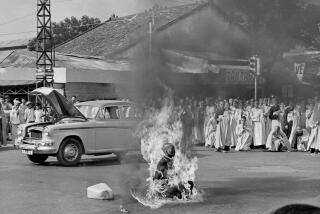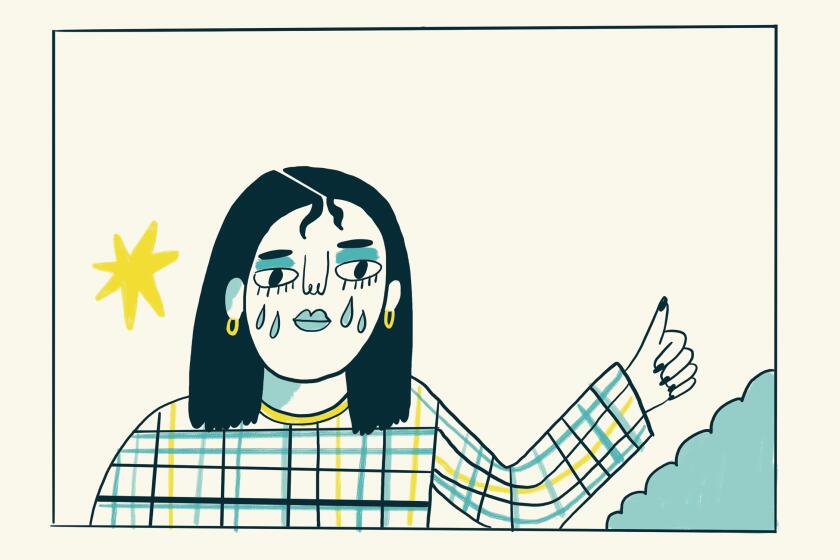Op-Ed: The indoctrination of a young girl
Twice I’ve seen fanaticism at work. Now I see the signs a third time.
I was born in Tehran to a Muslim family. When I was 6, we traveled to London to see my grandmother and returned home as Christians. Then, for three years in Isfahan, I attended school in a head scarf that obscured my neck and hair, my lanky body draped in a shapeless gray manteau. I often boasted that I had accepted Christ a week before my mother had, that it was my freethinking ways that had led us here. I reveled in being different, a persecuted minority, bound in spirit with the first Christians who died for their faith.
In those days, in our underground church, we often talked about indoctrination and cults, because we believed Islam to be a cult. “Their prayers are memorized lines of Arabic,” we said. “It’s all ritual. And they trust whatever the mullahs say.” Our pastors condemned the maddening tactics of the state — the single sanctioned news source, the depiction of the West as the Great Satan, the suppression of the arts, the seemingly random enforcement of morality laws, and the deference to the great charismatic leader, Khomeini. We marveled at how the Islamic state used fear to suppress and control and how we, the dissenters, the persecuted, the believers, were the ones who had chosen freely. We had the open eyes, the hearts attuned to truth, the direct line to God.
My evangelical group at an Ivy League university assaulted my individuality, identity and self-esteem as surely as my state-run school in Iran.
In my state girls’ school in Isfahan, I saw that the church leaders were right. We children were forced to stand in perfect lines each morning chanting our loyalty to the state, to the Ayatollah. We strained our little lungs — “Death to Israel! Death to America!” — unaware of who we were cursing, or the meaning of death. When I tried to opt out of weekly religion classes, two teachers held me in the schoolyard for hours. They were both Basij Sisters, members of the volunteer militia, their main function to catch out other women. They warned me of all that could happen to me and to my family if I persisted in calling myself a Christian. My mother would be jailed. She would be beaten and killed.
When I was 8, my mother, brother, and I escaped Iran. We lived for two years as refugees, then we were sent to an Oklahoma suburb where we attended church every Sunday. At 10 I stood unquestioning and determined in a circle of women and girls, our heads down, hands gripped tight on both sides, as the women begged the Lord to grant the girls the gift of Tongues. In less than an hour, the other two girls had achieved this strange ecstasy. The women told me that I simply did not believe enough. How could I believe more, I wondered.
As a teenager, I was invited to attend a retreat called Chrysalis, a gender-segregated event that my friends praised as a transformative spiritual experience. When we arrived, our bags and watches were taken from us and we learned that Chrysalis had its own units of time measured by the space between two fingers. We were disoriented, an effect amplified by the removal of all natural light and a constant supply of caffeine and sugar. We returned to our beds to find that our bags had been unpacked for us, our pajamas and toiletries arranged on the bed in an unsettling performance of care. The weekend was full of confessions and hints at kinship and group identity designed to make us cry. No one was outraged.
At Princeton, I joined Campus Crusade for Christ, a group that took out full-page anti-choice ads in the campus paper, then used the rhetoric of the persecuted religious minority to defend itself — these people thought they were in some underground church, like the one in Isfahan, and, at the time, instead of offending me, this made me feel at home. Soon after, the group changed its name to Agape Christian Fellowship because the word “Crusade” brought to mind a bloody history.
Agape’s primary concern, the subject of most lectures and group discussions, was our sex lives, especially those of the women. Once in a female-only discussion, a virginal 30-year-old spoke about the evils of masturbation, how succumbing to it would guarantee that our future husbands would be unable to satisfy us. She told us that dressing provocatively made us responsible for the sins of men and that we shouldn’t date without the intent to marry.
That semester I read “The Handmaid’s Tale” and didn’t sleep for a week.
Weren’t we were supposed to be free, we Christians? I had been told that Jesus respected women and hated their treatment by Islam. And yet, here was a free woman in the prime of her life, standing before a group of American university students at the dawn of a new century, saying that we should submit to our husbands, reading from a book called “Lady in Waiting.”
It all sounded so much like the old hijabi rhetoric, those Basij Sisters from long ago, the glee in their eyes, rolling the power on their tongues the way you roll a piece of sour tamarind. Those women, too, were only teachers, only volunteers, and yet the Basij Sisters roamed the streets of Isfahan and Tehran, stopping women, judging the modesty of every garment, the tightness of every hijab and the meaning of every saunter.
It took me years to see the parallels. It’s so easy for us, citizens of democratic countries, to think ourselves immune, in control of our own thoughts. We attach words like “brainwashing” to cults and radical sects. And yet modern Christians use a shocking variety of tools to program their children. My evangelical group at an Ivy League university assaulted my individuality, identity and self-esteem as surely as my state-run school in Iran.
Recognizing indoctrination at work requires an outsider’s eye. That’s why it’s so easy to see it in other communities and not our own. It is designed to be invisible to those wallowing in its toxic fog. And yet I see it happening again. We are living in an era of fanaticism, and, despite every effort to guard against it, I’m not immune. No one is.
After a childhood spent under the hijab, this is the part that keeps me up at night: I don’t receive the same news as my conservative neighbors. I don’t read the same articles, or hear the same rhetoric. Across the political spectrum, we are dividing ourselves into bubbles, and we are relinquishing our skepticism, curiosity and intellectual independence in favor of tribal allegiance.
In post-revolutionary Iran, too, our truths came from our tribes — the underground church, the Basij teachers, the local mosque. Social programming doesn’t happen in just one room or one newsfeed, to just a dozen girls at a time. It is mass deference to a higher authority in a broad range of unrelated issues linked within an ideology. It’s a willingness to confess, to chant, to switch off, to feel shame for arriving at different conclusions. And it doesn’t look sinister at first. It looks like rescue, freedom from responsibility. It’s someone who has the answers and offers them to you, if you will only accept.
Dina Nayeri’s novel “Refuge” will be published in July.
Follow the Opinion section on Twitter @latimesopinion or Facebook
More to Read
A cure for the common opinion
Get thought-provoking perspectives with our weekly newsletter.
You may occasionally receive promotional content from the Los Angeles Times.






